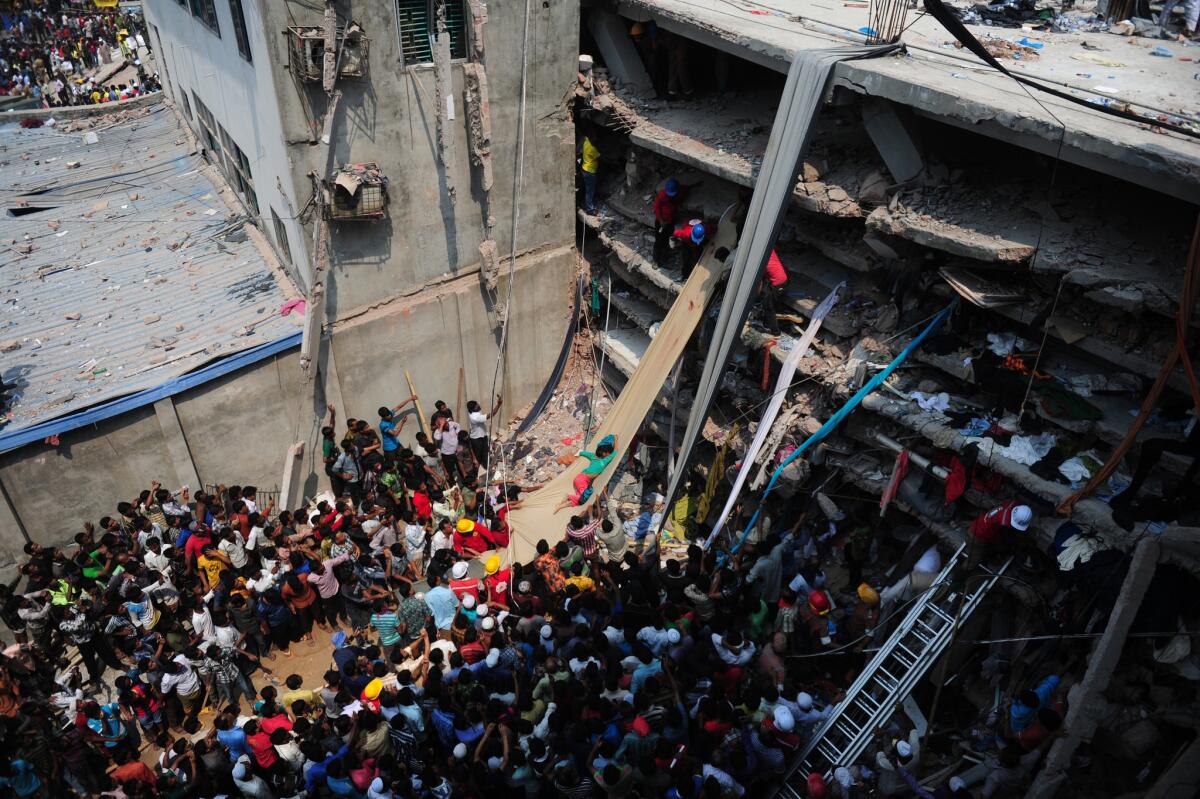Death toll from Bangladesh building collapse climbs to over 200

NEW DELHI – As rescue workers clawed through the wreckage Thursday after a building collapsed in Bangladesh, the toll rose to at least 225 people killed, most of them apparel workers, and over 1,000 injured.
News footage showed desperate workers digging through the night, crafting escape chutes from bolts of fabric.
Labor rights activists reported that workers noticed large cracks in the building but were ordered back to their sewing machines shortly before the Rana Plaza building pancaked Wednesday morning just outside the nation’s capital of Dhaka.
For once, political turmoil in Bangladesh proved a blessing. A general strike called by the opposition Wednesday left most shops on the bottom two floors closed even as apparel factories on top continued operating.
“We were lucky, it could have been much worse,” said Mohammad Alimullah Miyan, a disaster management specialist and vice chancellor of Dhaka’s International University of Business Agriculture and Technology. “But people are very angry.”
Other garment factories closed Thursday after workers threatened to sabotage equipment unless the premises were shuttered in sympathy, even as over 20,000 laborers blocked the Dhaka-Narayanganj highway.
Factories involved in Wednesday’s disaster reportedly produced garments for Wal-Mart, Anaheim-based PacSun and Spain’s Mango.
Bangladesh’s $20-billion apparel export industry has grown rapidly – it’s now the world’s second largest after China -- accounting for a whopping 80% of all national exports. This gives factory owners significant clout in sidestepping onerous work and safety rules, with more than two dozen apparel makers now serving as lawmakers.
The latest Bangladesh factory collapse follows a fire at Dhaka’s Tazreen Fashion late last year that killed 112. The factory lacked emergency exits and many workers burned alive after being told it was just a fire drill.
In a filing to the U.S. Trade Representative’s Office on Wednesday on retaining preferential access to U.S. markets, Bangladesh promised reforms but revealed that it has just 183 inspectors on paper – half the positions are vacant – overseeing 4,500 garment factories.
It said it was adding fire inspector teams and had set up a hot line for workers to report “fire safety risks,” even as it denied claims by the AFL-CIO that it was making collective bargaining difficult.
While the worker safety picture in Bangladesh remains pretty bleak, experts said, each disaster increases the pressure -- at least incrementally -- to reform or risk losing scandal-wary global customers. “Creating real change will take years,” said Raina. “There’s no way you can fix this immediately.”
ALSO:
Activists: Bangladesh workers told to enter building before collapse
In Beijing, Dempsey warns of further North Korean provocations
Egypt president sees ‘deep state’ as enemy within
Tanvi Sharma in the New Delhi bureau contributed to this report.
More to Read
Sign up for Essential California
The most important California stories and recommendations in your inbox every morning.
You may occasionally receive promotional content from the Los Angeles Times.










